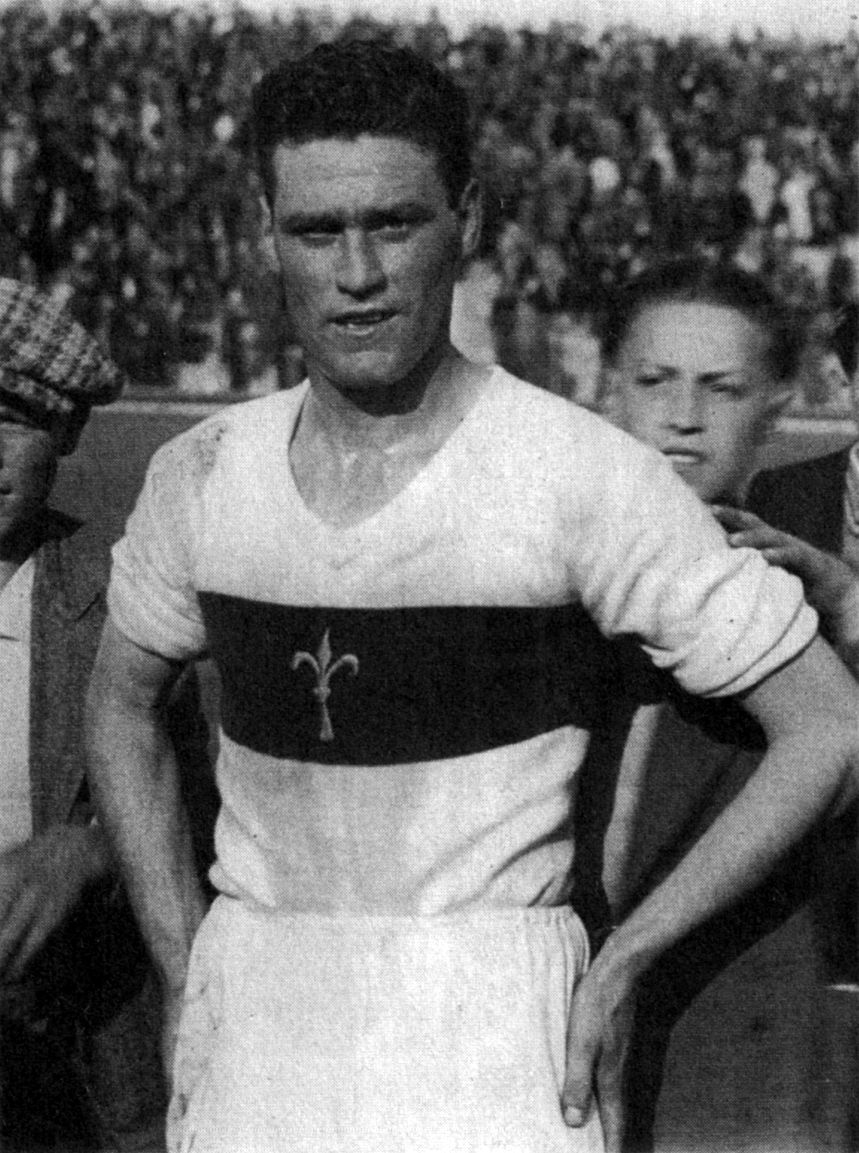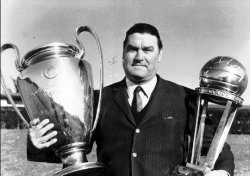1. Playing career
Nereo Rocco had a modest playing career primarily as a winger in midfield, spanning 11 seasons.
1.1. Club career

Rocco spent the majority of his playing career with Italian clubs such as Triestina, Napoli, and Padova. He played a total of 287 matches in Serie A, the top Italian football league, during which he scored 69 goals. His playing career, while not as illustrious as his managerial one, laid the foundation for his deep understanding of the game.
1.2. International career
Rocco earned a single cap for the Italy national team. This appearance came on 25 March 1934, when he was selected by coach Vittorio Pozzo for a 1934 FIFA World Cup qualification match against Greece. Italy secured a dominant 4-0 home victory in this qualifier.
2. Coaching career
Nereo Rocco's coaching career was extensive and marked by groundbreaking tactical innovations and significant trophy successes, particularly with A.C. Milan.
2.1. Early career (Triestina, Treviso)
Rocco began his coaching journey with his hometown club, Triestina, in 1947, just two years after retiring as a player. In a surprising achievement, he led Triestina to a second-place finish in Serie A, which remains the highest league position ever attained by the club. Due to disagreements with the club's chairmanship, he departed Triestina a few years later. In 1951, he had a brief coaching spell at Treviso before returning to Triestina in 1953.
2.2. Padova and the introduction of Catenaccio
In 1953, Rocco took over as coach of Serie B team Padova. He successfully steered the team away from relegation and secured their promotion to Serie A in the following season. Rocco's tenure at Padova is widely remembered as the most successful period in the club's history. Despite managing a relatively small team, he guided them to an impressive third-place finish in the 1957-58 Serie A season. It was during his time with Padova that Rocco emerged as one of the earliest and most significant proponents and developers of the catenaccio tactical system in Italian football. Additionally, he coached the Italian Olympic team alongside Giuseppe Viani at the 1960 Summer Olympics in Rome, where they achieved a fourth-place finish.
2.3. First spell at A.C. Milan
In 1961, Rocco was appointed as the new coach of A.C. Milan, replacing Paolo Todeschini. This marked the beginning of one of the most successful eras for the Rossoneri. Rocco meticulously built a hard-working and defensively solid side, centered around the team's young star playmaker, Gianni Rivera, who had joined the club in 1960 from Alessandria. Rivera's creative playing style perfectly complemented Rocco's tactical approach. Throughout his career, Rocco formed a crucial relationship with Rivera, and together, they were instrumental in the club's triumphs. Under Rocco's leadership, Milan secured the Serie A title in 1962 and achieved their first-ever European Cup victory in 1963.
2.4. Torino and return to A.C. Milan
After his initial successful period at Milan, Rocco had a notable stint at Torino from 1963 to 1967. During this time, he achieved the best results for the club since the tragic demise of the Grande Torino team in the 1949 Superga air disaster. In 1967, Rocco returned to A.C. Milan for his second spell, replacing Arturo Silvestri. Upon his return, he immediately led the club to another scudetto (Serie A title) and the UEFA Cup Winners' Cup. He continued to achieve remarkable success, winning another European Cup in 1969, notably defeating Rinus Michels' Ajax 4-1 in the final. His second tenure also saw Milan clinch an Intercontinental Cup, two Italian Cups (1971-72, 1972-73), and another UEFA Cup Winners' Cup (1972-73). Rocco departed Milan in 1973. He is Milan's longest-serving manager, having managed the club for a total of 459 matches, comprising 323 as head coach and 136 as technical director.
2.5. Later career (Fiorentina, Technical Director)
Following his departure from Milan in 1973, Rocco had a brief managerial spell at Fiorentina for one year, from 1974 to 1975, after which he decided to conclude his active coaching career. However, his association with Milan was not entirely over. In 1977, he was re-appointed by the club as Technical Director and Assistant Coach, working alongside former player Nils Liedholm. This role marked the final chapter of his direct involvement in team management.
3. Style of management and tactics
Nereo Rocco was renowned for his distinctive managerial approach, tactical innovations, and charismatic personality, which left a lasting impact on football.
3.1. Tactical philosophy
Rocco is celebrated as one of the first and most successful proponents of catenaccio in Italy. Drawing inspiration from Karl Rappan's tactics, his teams effectively utilized a sweeper (or libero) who would position himself behind the main defensive line to clear any loose balls, often employing a 1-3-3-3 formation. His teams were characterized by their exceptional work-rate and physical prowess. Rocco's tactical strategies were simple yet highly effective and pragmatic, prioritizing defensive strength and the ability to launch quick counter-attacks with long balls. His teams excelled at scoring goals immediately after winning back possession, rather than focusing on an aesthetically pleasing style of play. During his highly successful period with Milan, he strategically used Gianni Rivera as the team's central playmaker in midfield, entrusting him with the primary creative responsibilities.
3.2. Player relations and motivation
Rocco was an exceptional motivator who cultivated strong personal relationships with his players, fostering a positive team environment and instilling a winning mentality. He was known for discussing team tactics and individual man-marking roles over dinner, preferring this informal setting to a traditional whiteboard session during training. Beyond his tactical acumen, Rocco possessed a charismatic personality, strong leadership qualities, and a keen sense of humor, despite his naturally shy demeanor. He was a very animated figure on the bench during matches, passionately directing his team. He also gained popularity for his witty remarks and quips, which he frequently shared with both his players and journalists. A famous response attributed to him during his Padova spell, when an opponent would say, "May the best team win," was, "Let's really hope not!" Rocco was popularly known as El Paròn (El ParònThe MasterFriulian), a Triestin term, reflecting his strong use of his native dialect. Former Parma manager Nevio Scala, who played under Rocco, was deeply inspired by his charisma and his approach of giving players more freedom by de-emphasizing rigid tactics and set plays during training.
3.3. Influence and recognition
Rocco's tactical innovations and managerial style had a profound influence on subsequent generations of football managers. Notably, his tactics heavily influenced Giovanni Trapattoni, who became one of the main proponents of the zona mista (zona mistamixed zoneItalian), also known as gioco all'italiana (gioco all'italianaItalian gameItalian). This tactical approach combined elements from both man-to-man marking systems, characteristic of Italian catenaccio, and zonal-marking systems, reminiscent of Dutch total football.
4. Death and legacy
Nereo Rocco's passing marked the end of an era, but his legacy continues to be celebrated in the world of football.

4.1. Death
Nereo Rocco died on 20 February 1979, at the age of 66, in his hometown of Trieste, Italy.
4.2. Legacy and influence
Rocco's significant contributions to football were recognized posthumously. On 18 October 1992, a new stadium in Trieste was inaugurated and named the Stadio Nereo Rocco in his honor, serving as a lasting tribute to his impact on the city and the sport. His tactical principles, particularly his development and successful application of catenaccio, continue to be studied and discussed in football history. His influence extended to prominent managers like Giovanni Trapattoni, ensuring his tactical ideas lived on and evolved within the sport. Rocco's enduring legacy is also cemented by his inclusion in various football halls of fame and his consistent ranking among the greatest managers of all time.
5. Honours
Nereo Rocco's managerial career was highly decorated, earning him numerous team titles and individual accolades.
5.1. Manager
A.C. Milan
- Serie A: 1961-62, 1967-68
- Coppa Italia: 1971-72, 1972-73, 1976-77
- European Cup: 1962-63, 1968-69
- UEFA Cup Winners' Cup: 1967-68, 1972-73
- Intercontinental Cup: 1969
5.2. Individual
- Seminatore d'Oro: 1962-63
- Italian Football Hall of Fame: 2012
- France Football 17th Greatest Manager of All Time: 2019
- World Soccer 36th Greatest Manager of All Time: 2013